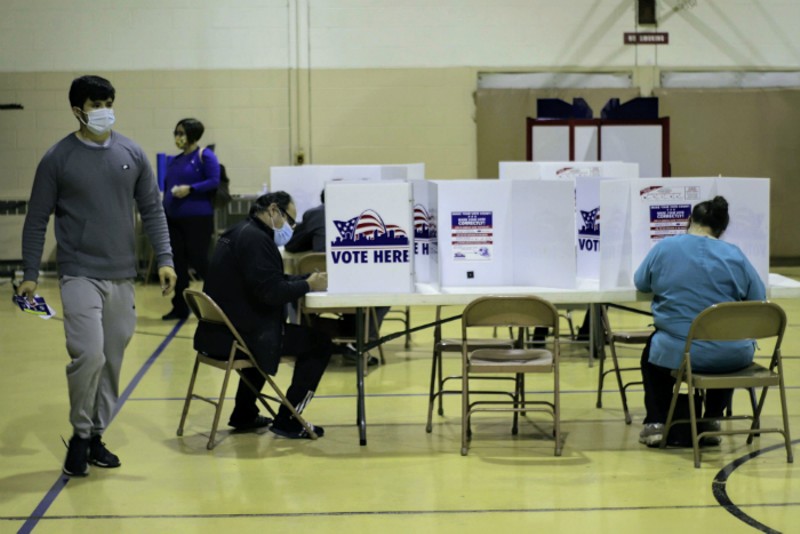As Trump Tweets About Voter Fraud, We Asked Experts to Clear Up the Misinformation
Voter fraud is something you probably heard about in the months leading up to the election. President Donald Trump has claimed that this year’s election will be “the most corrupt election in the history of our country,” particularly attacking mail-in and absentee ballots that have increased in numbers during the COVID-19 pandemic. It may be hard to navigate the truth through all the Twitter posts that Trump shoves down our throats, but we spoke to some experts ahead of Election Day to clear up the misinformation.
Political science professors Mary Stegmaier from the University of Missouri and Barbara Hosto-Marti from Lindenwood University are election experts who gave some insight on ballot counting and the myth of voter fraud as we wait to see who will be the next president.
The president has made many false statements about how mail-in and absentee ballots lead to fraud. Is this election really as much of a disaster as he makes it out to be?
Stegmaier: While it might take longer to finalize the vote counts due to the massive increase in absentee voting this year, we need to be patient and let election officials process the ballots and count accurately.
Hosto-Marti: I do not believe that this election will be a disaster. Election officials have been competently processing absentee and mail-in ballots since the Civil War. Even with the increase in the number of ballots, these dedicated professionals are going to rise to the challenge. We the people will have to be patient because we might not know the outcome on election night. Misinformation is the biggest threat to our election. With election rules changing to provide safe voting during this pandemic, voters are more confused than ever. It is essential that we all think critically and evaluate the source of election information.
Will the increased number of mail-in and absentee ballots make it easier for voter fraud to occur?
Stegmaier: There is no evidence that mail-in or absentee voting leads to increases in fraud. For example, in Oregon, which has offered mail-in voting since 1987 and has been voted exclusively mail-in since 1998, only a few dozen instances of fraud have been uncovered. These seem to be confusion over who signs the exterior envelope.
Hosto-Marti: Not really, election officials are skilled at processing these types of ballots. What is likely to increase is voter errors. If you have never voted absentee before you are more likely to make an error that could cause your vote to be rejected.
Is there any way that postal workers or electoral workers could tamper with ballots that would change people’s votes or discount them?
Stegmaier: Postal workers have ethics standards — they deliver confidential mail every day. But even if they did try to tamper with the mailed ballots, the falsified ballots would be identified when the mail-in ballots are processed. In processing the ballots, voter signatures and other information on the envelope are cross-checked to ensure a match. As to the question of electoral workers tampering — there are safeguards in place to ensure this doesn’t happen.
Hosto-Marti: I hate to speculate on hypotheticals. Of course, it is possible to tamper with ballots, but it is rare and unlikely to occur on a scale large enough to change the outcome. The vast majority of election workers and postal workers are dedicated individuals who take their role in our elections seriously.
Should we trust the results of the election once it is independently verified?
Stegmaier: I have confidence in our elections and the safeguards we have in place to ensure elections are free and fair. Once the elections are certified in the states, we can trust the results.
Hosto-Marti: Yes, we should. For the most part, our elections are run by dedicated professionals. While these professionals often represent a political party, I believe that they are committed to ensure a transparent and fair election. There are many checks and balances built into the system to protect the integrity of the process. We are aware of some headline examples of voter fraud because the system identified them and stopped them before they could change the results of the election.
What is the single most important thing for voters to know regarding the integrity of this year’s election?
Stegmaier: Our elections are governed by laws and processes that help ensure valid votes are accurately counted. These laws govern who is eligible to vote, the steps poll workers must take to check in voters and issue ballots, and how absentee ballots are verified and counted. With so many voters voting early this year, it might take time for some counties to finalize the results. And if it takes time, we as citizens need be patient and let election officials carry out their work with care and integrity. Also, I always encourage people who want to learn more about how elections are run to volunteer as a poll worker!
Hosto-Marti: To have faith in your fellow citizens and the professionals that administer the election. These are tense times, and it feels like so much is riding on the outcome of this election. Still most people vote with integrity and good intentions.


